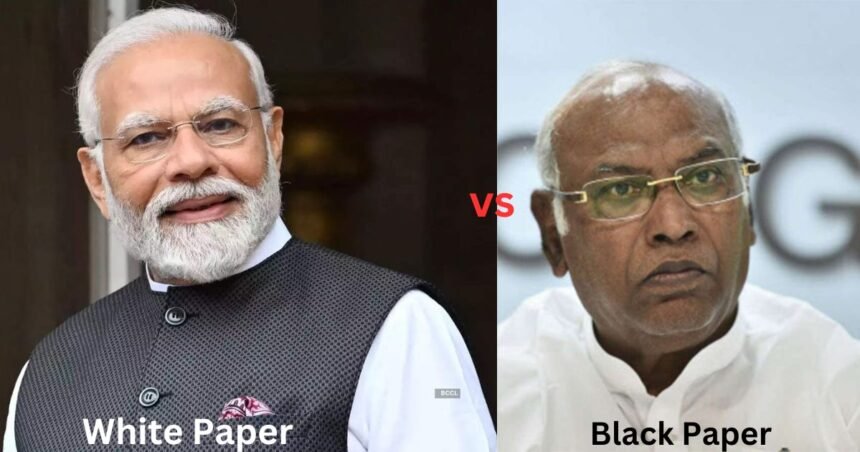Introduction
The term “Black Paper” is utilized to emphasize the perceived shortcomings or failures of the government. In a recent development, the Congress party released a “Black Paper” as a direct response to the forthcoming “White Paper” expected to be presented by the central government during the current budget session of Parliament in New Delhi.
The Congress party has released a “black paper” titled ’10 Saal Anyay Kaal 2014-2024 (10 years of injustice)’ ahead of the NDA government’s presentation of a white paper in Parliament. This move reflects the ongoing political dialogue surrounding the performance and governance of the Modi administration.
White Paper in Indian Parliament
A ‘white paper’ in the context of the Indian Parliament refers to an informational report issued by the government. These reports typically focus on outlining government policies, achievements, and pertinent issues. The term “white paper” stems from the color-coded system used for distributing government documents, with white being designated for public access, as explained by Stanford Law School.
Significance of White Papers
White papers serve as valuable tools for informing the public about the government’s initiatives, accomplishments, and challenges. They provide transparency and insight into government decision-making processes, facilitating public understanding and engagement with governance issues.
Exploring Black Paper in Politics
Contrary to the informational nature of white papers, a “black paper” in politics often serves as a critical document that highlights perceived failures or shortcomings of a government’s policies or actions. In the case of the Congress party’s black paper, it critiques the Modi administration’s tenure, citing issues such as high unemployment rates, economic disruptions caused by measures like demonetization and the Goods and Services Tax (GST), and their purported adverse effects on the socio-economic landscape. Specifically, the black paper contends that these policies have widened the gap between the affluent and the impoverished, and have had detrimental effects on the livelihoods of farmers and daily wage earners.
Role of Black Papers in Political Discourse
Black papers play a crucial role in political discourse by offering alternative perspectives and scrutinizing government policies and actions. They serve as platforms for opposition parties to voice dissent and hold the ruling government accountable for its decisions. Additionally, black papers contribute to public discourse by shedding light on issues that may not receive adequate attention through official government channels.
Introduction: Government’s Initiative
The Narendra Modi-led National Democratic Alliance (NDA) government is set to unveil a ‘White Paper’ shedding light on economic mismanagement during the Congress-led United Progressive Alliance (UPA) government’s tenure before 2014. This development holds significant importance and has prompted an extension of the current Budget session of Parliament.
Content of the White Paper
The forthcoming White Paper aims to provide a detailed analysis of India’s economic challenges and their repercussions under the UPA government. It will delve into the negative impacts of economic policies during that period and highlight the potential positive measures that could have been implemented.
Global elections 2024: The future of governments around the world will be decided
Earlier Announcement by Finance Minister
During her Interim Budget speech on February 1, Finance Minister Nirmala Sitharaman had already hinted at the government’s intention to release such a White Paper. She emphasized the need to assess the economic landscape pre- and post-2014 to draw lessons from past mismanagement. The Finance Minister reaffirmed this commitment during a post-budget interaction with Network 18, underscoring the focus on scrutinizing the economy’s performance during the previous regime.
Significance of the White Paper
The White Paper is expected to provide valuable insights into the economic challenges faced by India before the Modi government assumed office. By examining the past decade’s economic trajectory, the government aims to highlight areas of improvement and showcase its own governance in contrast. This initiative is crucial in fostering transparency, accountability, and informed decision-making in economic policymaking.
Context: Timing of the White Paper
The impending release of the White Paper coincides with the approaching general elections slated to be held between April and May 2024, marking a crucial period in India’s political landscape. The timing of this initiative aligns with the government’s efforts to provide a comprehensive assessment of economic governance before the electorate’s decision-making process.
Economic Landscape: Current Outlook
Many economists perceive the BJP-led NDA government’s economic performance favorably, citing impressive growth prospects. Projections indicate that India is poised to ascend to the position of the third-largest economy globally, with a projected GDP of $5 trillion within the next three years. This growth trajectory underscores the significance of ongoing reforms and underscores the country’s remarkable economic transformation over the past decade.
Evaluation of Economic Progress
A decade ago, India ranked 10th globally in terms of GDP, with a figure of $1.9 trillion. Presently, it has surged to the 5th position, with a projected GDP of $3.7 trillion for FY24, despite the challenges posed by the COVID-19 pandemic. The Finance Ministry’s review ahead of the Interim Budget 2024 highlights the robust domestic demand as a key driver, propelling the economy to a growth rate exceeding 7% in recent years.
Confidence in Economic Momentum
Reflecting the government’s confidence in India’s economic trajectory, Finance Minister Sitharaman emphasized the nation’s renewed vigor and purpose during her Budget speech. The minister’s remarks underscore the widespread belief that the benefits of development initiatives are reaching the populace at scale, instilling a sense of hope and purpose across the country.
Contents of the Black Paper
Economic Devastation
The black paper highlights the perceived devastation of the country’s economy during the tenure of the Modi government. It emphasizes the exacerbation of unemployment and the destruction of the agriculture sector as key points of contention.
Social Issues
Furthermore, the document asserts that the government has “abetted” crimes against women and has been responsible for “grave injustices” against minority communities. These claims are central to the narrative presented in the black paper.
Response and Political Commentary
Congress’s Jab
In response to the release of the black paper, Prime Minister Narendra Modi sarcastically thanked Congress President Mallikarjun Kharge for what he referred to as a “kaala teeka” (to ward off the evil eye) against his government. This reaction underscores the contentious nature of political discourse surrounding governance and accountability.
Overview of the Congress Booklet
The Congress party has released a booklet highlighting what it perceives as “economic, social, and political injustice” during the tenure of the Modi government over the past decade. This document also addresses concerns regarding the spread of social disharmony and compromises to national security. Notably, the themes presented in the booklet align closely with those of Rahul Gandhi’s ongoing Bharat Jodo Nyay Yatra.
Context: Modi’s Remarks in Parliament
Prime Minister Narendra Modi’s recent remarks in Parliament, criticizing the Congress on various issues, serve as the backdrop to the release of the booklet. Modi accused the Congress of dividing the country along regional lines and neglecting the interests of marginalized communities such as OBCs, SCs, and STs.
Response from Congress: Kharge’s Rebuttal
Congress leader Mallikarjun Kharge, upon releasing the booklet, countered the Prime Minister’s assertions on multiple fronts. He challenged Modi’s claim that the NDA government had elevated individuals from SC/ST communities to the presidency, stating that such appointments were not a significant achievement. Kharge highlighted the qualifications and achievements of past presidents, drawing a comparison between them and the current President, Droupadi Murmu.
Critique of Government Policies
Kharge further criticized the government’s alleged favoritism towards corporates, accusing them of receiving substantial loans while failing to generate employment opportunities for the youth. He emphasized that despite the government’s rhetoric, the economic situation has not improved, and there has been no alleviation in prices or increase in job prospects.
Allegations Regarding Electoral Bonds
Congress President Mallikarjun Kharge has accused the BJP of utilizing electoral bonds to raise funds through alleged coercion and harassment by governmental agencies. He contends that this practice undermines democracy, citing instances of MLA defections and government destabilization over the past decade.
Response to Intimidation and Abuse
Kharge revealed that he received abusive calls following his criticism of Prime Minister Modi’s speech, prompting him to file a police complaint. Undeterred by such tactics, he asserted his resilience and commitment to addressing the BJP’s shortcomings through debate and reasoned discourse.
Defiance Against Defamation
In the face of attempts to tarnish his reputation, Kharge expressed unwavering resolve, citing his extensive political experience and resilience to unwarranted attacks. He emphasized that the Congress party does not seek sympathy but aims to highlight the deficiencies of its adversaries.
Critique of Modi’s Conduct
Kharge denounced Modi’s attacks on Rahul Gandhi in the Rajya Sabha, asserting that a Prime Minister should exhibit statesmanship by articulating a vision for the nation’s progress rather than engaging in personal attacks. He also rebuked Modi’s alleged role in fostering a North-South divide, highlighting previous instances where Modi advocated for greater revenue allocation to states, contrasting it with his present rhetoric.
Accusations Against Modi
Finally, Kharge accused Modi of perpetuating division and inciting unrest, attributing divisive rhetoric and communal tensions to the Prime Minister’s actions and policies.
Rural Development Schemes in India
Conclusion
The impending release of the White Paper marks a significant step by the government to address concerns regarding economic mismanagement during the UPA era. By presenting a comprehensive analysis of past economic policies and their impacts, the White Paper is poised to inform public discourse and shape future policy directions.
As India stands on the cusp of significant economic growth and political transition, the release of the White Paper serves as a timely assessment of the nation’s economic journey under the NDA government. By contextualizing economic achievements within the broader political landscape, this initiative aims to inform public discourse and influence voter sentiment ahead of the upcoming general elections.
The release of the black paper by the Congress party signifies a counter-narrative to the forthcoming white paper by the NDA government. It reflects the ongoing political dialogue and criticism surrounding the performance and policies of the Modi administration.
The release of the Congress booklet and Kharge’s rebuttal illustrate the ongoing political discourse surrounding governance, social justice, and economic policies in India. The exchange reflects the contrasting perspectives of the ruling party and the opposition, highlighting areas of contention and debate within the country’s political landscape.
Kharge’s statements encapsulate the ongoing tension between the Congress party and the BJP, reflecting broader concerns regarding democratic integrity, political discourse, and governance in India. The exchange underscores the adversarial nature of contemporary Indian politics, characterized by allegations, rebuttals, and ideological confrontation.









